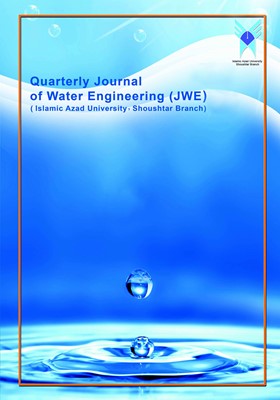Evaluation of Pre-ozonation Unit Efficiency in Turbidity and TOC Removal (Case Study: Kouhsabz Water Treatment Plant)
Subject Areas : water and wastewater
Bahman Masoomi
1
*
![]() ,
Nematollah Jaafarzadeh Haghighi Fard
2
,
Nematollah Jaafarzadeh Haghighi Fard
2
![]() ,
Tayebeh Tabatabaei
3
,
Esmael kouhgardi
4
,
Sahand Jorfi
5
,
Tayebeh Tabatabaei
3
,
Esmael kouhgardi
4
,
Sahand Jorfi
5
1 - Ph.D. Student of Environmental engineering, Islamic Azad University of Bushehr
2 - professor,Environmental Technologies Research Center,Ahvaz Jundishapur University of Medical Sciences,Ahvaz,iran
3 - Faculty member of Islamic Azad University of Bushehr
4 - Faculty member of Islamic Azad University of Bushehr
5 - Faculty member of Ahvaz Jundishapur University
Keywords: Removal Efficiency, TOC, kouh sabz water treatment plant, pre-ozonation, turbidity,
Abstract :
The overall objective of this study was to investigate the turbidity and total organic carbon (TOC) of raw water entering the treatment plant and the pre-ozonation unit's efficiency is to remove these compounds. Sampling from raw water and pre-ozonation water was done within 6 months and tested according to the standard method of the method. The results showed that there was a direct correlation between total organic carbon content and turbidity that's more in winter and in February with a high turbidity of 18NTU and TOC above 7mg / l. It was also found that the average pre-ozonation unit efficiency in the removal of total organic carbon with an average ozone dose of 3kg / hr and the contact time 18 minutes, is 20.52%, The highest TOC removal efficiency was in February (35.7%) and the lowest removal efficiency (14.08%) in May. The average turbidity removal efficiency is 61%, the highest and lowest percentages eliminated respectively were in February with 85.2% and 30% in July. Therefore, to increase the efficiency of pre-ozonation unit in removing organic compounds and ... It is necessary to carefully consider the process and design factors To increase the efficiency of removal of compounds.
_||_

